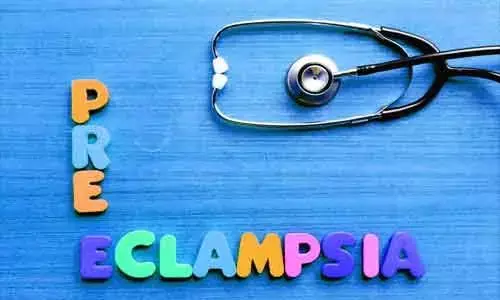- Home
- Medical news & Guidelines
- Anesthesiology
- Cardiology and CTVS
- Critical Care
- Dentistry
- Dermatology
- Diabetes and Endocrinology
- ENT
- Gastroenterology
- Medicine
- Nephrology
- Neurology
- Obstretics-Gynaecology
- Oncology
- Ophthalmology
- Orthopaedics
- Pediatrics-Neonatology
- Psychiatry
- Pulmonology
- Radiology
- Surgery
- Urology
- Laboratory Medicine
- Diet
- Nursing
- Paramedical
- Physiotherapy
- Health news
- Fact Check
- Bone Health Fact Check
- Brain Health Fact Check
- Cancer Related Fact Check
- Child Care Fact Check
- Dental and oral health fact check
- Diabetes and metabolic health fact check
- Diet and Nutrition Fact Check
- Eye and ENT Care Fact Check
- Fitness fact check
- Gut health fact check
- Heart health fact check
- Kidney health fact check
- Medical education fact check
- Men's health fact check
- Respiratory fact check
- Skin and hair care fact check
- Vaccine and Immunization fact check
- Women's health fact check
- AYUSH
- State News
- Andaman and Nicobar Islands
- Andhra Pradesh
- Arunachal Pradesh
- Assam
- Bihar
- Chandigarh
- Chattisgarh
- Dadra and Nagar Haveli
- Daman and Diu
- Delhi
- Goa
- Gujarat
- Haryana
- Himachal Pradesh
- Jammu & Kashmir
- Jharkhand
- Karnataka
- Kerala
- Ladakh
- Lakshadweep
- Madhya Pradesh
- Maharashtra
- Manipur
- Meghalaya
- Mizoram
- Nagaland
- Odisha
- Puducherry
- Punjab
- Rajasthan
- Sikkim
- Tamil Nadu
- Telangana
- Tripura
- Uttar Pradesh
- Uttrakhand
- West Bengal
- Medical Education
- Industry
Single blood sample can detect women at risk of pre-eclampsia

A study of pregnant women's blood RNA has found specific molecular profiles that identify women at risk of pre-eclampsia. These insights can identify complications before a woman experiences symptoms.
The study, published today in Nature, involved researchers from King's and Guy's and St Thomas' NHS Foundation Trust in partnership with Mirvie. The study examines genetic material found in blood samples that can predict pregnancy complications such as pre-eclampsia.
Pre-eclampsia effects up to 1 in 12 pregnancies and is a significant cause of maternal morbidity. It is also a cause of a higher risk of cardiovascular disease. Most cases of pre-eclampsia are diagnosed when the mother experiences symptoms in the third trimester. This study could widen the window of detection and lead to quicker intervention.
Professor Rachel Tribe, Department of Women and Children's Health, King's College London, said: "I am delighted to be involved in this important collaborative effort to develop a new tool to predict pre-eclampsia.
"Using a cutting-edge sequencing approach, we were able to detect cell free RNA (cfRNA) in the blood of pregnant women. These provided a molecular signature that can be used to identify women at risk of pre-eclampsia.
She added: Excitingly, this requires only a single blood sample and has potential to identify women at risk much earlier in pregnancy so that they can be more closely monitored and treated by the clinicians involved."
Researchers took 2500 blood samples from eight prospectively collected cohorts that included multiple ethnicities, nationalities, socioeconomic contexts and geographic locations. They then examined the anonymised cfRNA profiles – signals from the fetus and pregnant mother's tissues – that reflect fetal development and healthy pregnancy progression. This provided a non-invasive window into maternal and fetal health.
In this study, researchers show the cfRNA signals which deviate from those of a healthy pregnancy. One single blood sample could reliably identify women at risk of developing preeclampsia months prior to the presentation of the disease. Using machine learning to analyse tens of thousands of RNA messages from the mother, baby and placenta, the Mirvie RNA platform can identify 75% of women who go on to develop preeclampsia. Researchers hope this test can be widened to investigate other pregnancy complications, such as preterm birth.
Professor Tribe added: "Because the study drew upon samples for a diverse group of women, including participants recruited across King's Health Partners, the molecular signature is very reliable and has potential to outperform currently available tests.
'We are now focused on ongoing clinical research to further validate these results and improve the understanding of other pregnancy complications. As a scientist, it was also extremely interesting to see that the molecular signature tells us something about mechanisms associated with health in pregnancy and complications including preeclampsia; such knowledge will aid development of treatment strategies in the future."
The research was supported by the National Institute for Health Research (NIHR) through the NIHR Guy's and St Thomas' Biomedical Research Centre and an NIHR Doctoral Research Fellowship.
Hina Zahid Joined Medical Dialogue in 2017 with a passion to work as a Reporter. She coordinates with various national and international journals and association and covers all the stories related to Medical guidelines, Medical Journals, rare medical surgeries as well as all the updates in the medical field. Email: editorial@medicaldialogues.in. Contact no. 011-43720751
Dr Kamal Kant Kohli-MBBS, DTCD- a chest specialist with more than 30 years of practice and a flair for writing clinical articles, Dr Kamal Kant Kohli joined Medical Dialogues as a Chief Editor of Medical News. Besides writing articles, as an editor, he proofreads and verifies all the medical content published on Medical Dialogues including those coming from journals, studies,medical conferences,guidelines etc. Email: drkohli@medicaldialogues.in. Contact no. 011-43720751


